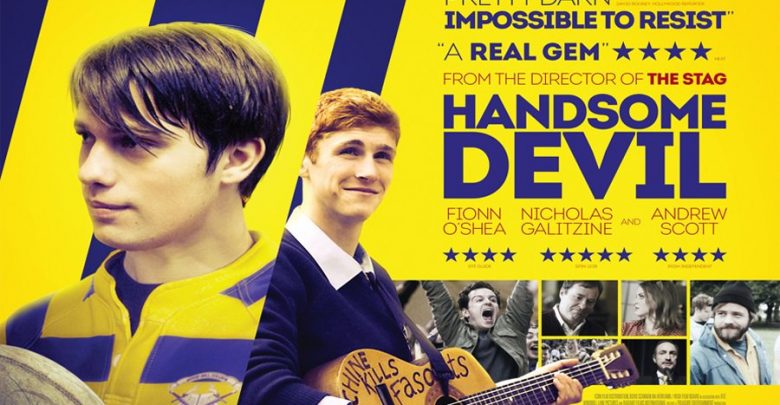Netflix Review: Handsome Devil
 Jake Gallant
Jake GallantHandsome Devil is an Irish film about sexualism, self-acceptance, and overcoming corrupt authority figures.
At times it comes across as a generic indie film; however, the film ultimately subverts many expectations of the genre. The film also expertly displays issues unique to queer youth. It stars Fionn O’Shea as Ned Roche, the only openly gay guy at a rugby-obsessed, all-male boarding school. The role earned O’Shea a (much deserved) win for best actor in a leading role at the FilmOut San Diego LGBT+ film festival.
Ned is the sort of protagonist that feels commonplace in indie flicks. He’s cynical, downtrodden and has a love of old, obscure music “because modern life is rubbish.” A line which is arguably much more cringe-worthy than Tate Langdon’s “Got any Cobain on that thing?”
Ned’s new roommate, Conor Masters (Nicholas Galitzine), is a star-rugby player who has been expelled from his old school. Moreover, he’s concealing his own homosexuality. The film is unique in its presentation of two gay male leads who form a strong friendship, as opposed to a romantic relationship. Additionally, the film gives a seldom-seen cinematic focus to how passing as straight can affect coming out and one’s queer identity.
The opening scene is indicative of a pretty cliche way of characterizing a teenager and his relationship with his parents — the teen fighting with his parents about dropping out of school, and the parents advocating the necessity of a good education. For instance, Ned’s desire to dropout of school (or at least the school he attends) is relatively valid. It’s a result of the bullying and discrimination he faces, which is largely representative of why queer youth have a much higher rate of dropping out of school altogether.
The boarding school Ned and Conor attend is modelled upon Castleknock and Clongowes, two prominent all-male, rugby-obsessed colleges in Ireland. It’s noteworthy that in Ireland and the UK, ‘college’ typically refers to schools for students age 16-18, or age 16 and up. The fictitious school is so rugby-obsessed that the headmaster begins his speech at an assembly with the word “rugby” and all the students in the audience (save for our lead, because he’s #NotLikeTheOtherBoys) lose their minds.
In the film, Ned is harassed and discriminated against by a near majority of the student body, as well as the rugby coach. The ostracism and harassment Ned endures are indicative not only of circumstances queer youth regularly face, but also of the snobbery and elitism symptomatic of the Irish private school system. The go-to term of Ned’s tormentors is ‘gay’ and a litany of Irish & British synonymic slanders for the term. Over a montage of such variations of the term being flung at Ned, he explains what they actually mean: “Gay means crap, bad, or different. And the fear of being in any way different ran through our school top to bottom.”
First off, that’s a solid gay pun. Secondly, it’s a succinct summarization of a massive reason queer individuals face such discrimination. Acceptance from others is a deeply instinctive need; we’re social creatures by nature and to our distant ancestors, marginalization meant death.
It is estimated that between two and ten per cent of the global population is homosexual. For youth, being (or being publicly thought of as being) part of such a statistically smaller group can activate our animalistic fear of separation from the herd. As Ned’s schoolmates show us, a method many often adopt to ensure that they’re not thought of as being in this considerably smaller, marginalized segment of the population, is to make a mockery of the segment altogether.
Ned’s being openly gay makes him the constant victim of his classmates’ scrutiny. However, Conor forgoes such scrutiny despite being gay as well. Not only is Conor closeted, but his rugged athleticism, penchant for violence, and suave aesthetic result in his coming across as stereotypically masculine. In the minds of many (such as the film’s characters), this problematically equates to coming across as a heterosexual male.
Conor blends in well with the hyper-masculine rugby team; his friendship with Ned though shows him that blending in won’t help him cultivate a positive self-image and find happiness. As their friendship grows, Conor begins to value Ned above his rugby team. He even goes so far as to violently beat a teammate that had routinely bullied Ned. This act of aggression wasn’t uncharacteristic for Conor; it is revealed to be how he responded to being the victim of homophobia at his previous school.
Handsome Devil is a unique, subversive take on coming-of-age movies, despite occasionally feeling similar to a formulaic indie film. It’s exploration of prominent, but oft-ignored LGBT+ themes assures both its present relevance and future staying-power. The movie is suitable for all ages, with each age group able to draw different elements of import from its plot.
It is a highly recommended watch to anyone who’s ever wondered what the school system can be like for queer youth, and how it can impact the course of their lives.




